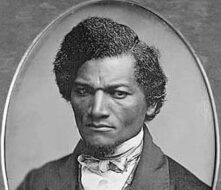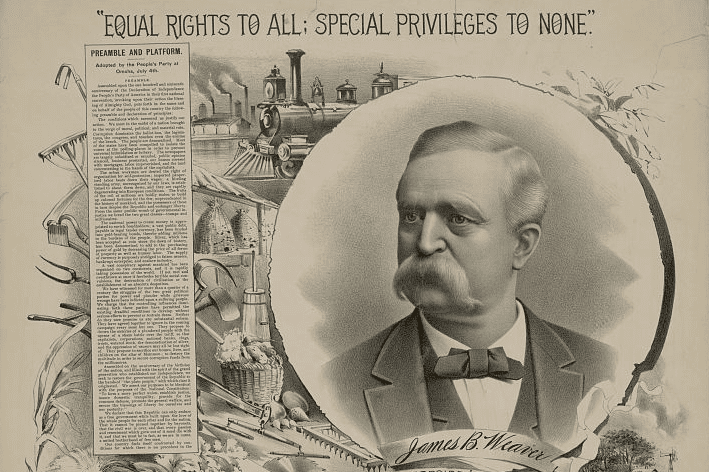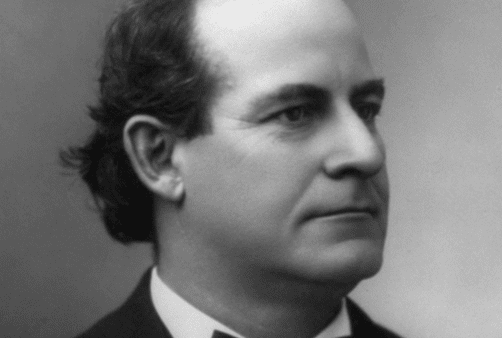
No related resources
Introduction
Although the Cleveland administration (1893–97) rejected the heavy-handed tactics used by the Harrison administration (1889–93) to acquire Hawaii, it was not averse to reminding the world that the United States was now a world power with international political clout. In fact, Cleveland’s secretary of state, Richard Olney, used language that bordered on the imperious when speaking of America’s role in the world. Olney observed of the Western Hemisphere that “the United States is practically sovereign on this continent, and its fiat is law upon the subjects to which it confines its interposition.”
Olney made this statement in a letter to the American ambassador to Great Britain, Thomas Bayard. He instructed Bayard to read this letter to the British foreign secretary and leave him a copy if he requested one. Olney took this opportunity to offer an expansive interpretation of the Monroe Doctrine, the first of many such interpretations as the United States emerged as a major power on the world scene.
The issue that prompted what became known as the Olney Corollary to the Monroe Doctrine was an American demand that Great Britain agree to international arbitration to settle a border dispute between British Guiana and Venezuela. The latter nation had asked the United States to intervene on its behalf, but Great Britain refused to allow U.S. interference in the matter. In this note and in other messages, the Cleveland administration indicated that if Britain continued to hold territory claimed by Venezuela, it would be seen by the United States as a violation of the Monroe Doctrine. The British argued that the Monroe Doctrine had no binding authority on them, prompting Cleveland to ask Congress for an appropriation that would allow an American team to determine the boundary. The implication was that if the British did not heed the American determination, war might result.
The U.S. Navy was ordered into the region as a show of force, and once again the United States appeared ready to fight its historic enemy. The British eventually agreed to arbitration, and an international panel settled the dispute in October 1899, awarding Britain the lion’s share of the disputed territory. But by agreeing to international arbitration, the British also seemed to accept the United States as the arbiter of disputes throughout the Americas.
Papers Relating to the Foreign Relations of the United States, with the Annual Message of the President, Transmitted to Congress December 2, 1895, part 1, available at https://history.state.gov/historicaldocuments/frus1895p1/d527.
To the territorial controversy between Great Britain and the Republic of Venezuela, thus briefly outlined, the United States has not been and, indeed, in view of its traditional policy, could not be indifferent. . . .
. . .Those charged with the interests of the United States are now forced to determine exactly what those interests are and what course of action they require. It compels them to decide to what extent, if any, the United States may and should intervene in a controversy between and primarily concerning only Great Britain and Venezuela and to decide how far it is bound to see that the integrity of Venezuelan territory is not impaired by the pretensions of its powerful antagonist. Are any such right and duty devolved upon the United States? If not, the United States has already done all, if not more than all, that a purely sentimental interest in the affairs of the two countries justifies, and to push its interposition further would be unbecoming and undignified and might well subject it to the charge of impertinent intermeddling with affairs with which it has no rightful concern. On the other hand, if any such right and duty exist, their due exercise and discharge will not permit of any action that shall not be efficient and that, if the power of the United States is adequate, shall not result in the accomplishment of the end in view. The question thus presented, as matter of principle and regard being had to the settled national policy, does not seem difficult of solution. Yet the momentous practical consequences dependent upon its determination require that it should be carefully considered and that the grounds of the conclusion arrived at should be fully and frankly stated.
That there are circumstances under which a nation may justly interpose in a controversy to which two or more other nations are the direct and immediate parties is an admitted canon of international law. The doctrine is ordinarily expressed in terms of the most general character and is perhaps incapable of more specific statement. It is declared in substance that a nation may avail itself of this right whenever what is done or proposed by any of the parties primarily concerned is a serious and direct menace to its own integrity, tranquility, or welfare. The propriety of the rule when applied in good faith will not be questioned in any quarter. On the other hand, it is an inevitable though unfortunate consequence of the wide scope of the rule that it has only too often been made a cloak for schemes of wanton spoliation and aggrandizement. We are concerned at this time however, not so much with the general rule as with a form of it which is peculiarly and distinctively American. Washington, in the solemn admonitions of the Farewell Address, explicitly warned his countrymen against entanglements with the politics or the controversies of European powers.1…
During the administration of President Monroe this doctrine of the Farewell Address was first considered in all its aspects and with a view to all its practical consequences. The Farewell Address, while it took America out of the field of European politics, was silent as to the part Europe might be permitted to play in America. Doubtless it was thought the latest addition to the family of nations should not make haste to prescribe rules for the guidance of its older members, and the expediency and propriety of serving the powers of Europe with notice of a complete and distinctive American policy excluding them from interference with American political affairs might well seem dubious to a generation to whom the French alliance, with its manifold advantages to the cause of American independence, was fresh in mind.
Twenty years later, however, the situation had changed. The lately born nation had greatly increased in power and resources, had demonstrated its strength on land and sea and as well in the conflicts of arms as in the pursuits of peace, and had begun to realize the commanding position on this continent which the character of its people, their free institutions, and their remoteness from the chief scene of European contentions combined to give to it. The Monroe administration therefore did not hesitate to accept and apply the logic of the Farewell Address by declaring in effect that American nonintervention in European affairs necessarily implied and meant European nonintervention in American affairs.2…
The Monroe administration, however, did not content itself with formulating a correct rule for the regulation of the relations between Europe and America. It aimed at also securing the practical benefits to result from the application of the rule. Hence [it] declared that the American continents were fully occupied and were not the subjects for future colonization by European powers. To this spirit and this purpose, also, are to be attributed the passages of the same message which treat any infringement of the rule against interference in American affairs on the part of the powers of Europe as an act of unfriendliness to the United States. It was realized that it was futile to lay down such a rule unless its observance could be enforced. It was manifest that the United States was the only power in this hemisphere capable of enforcing it. It was therefore courageously declared not merely that Europe ought not to interfere in American affairs, but that any European power doing so would be regarded as antagonizing the interests and inviting the opposition of the United States.
That America is in no part open to colonization, though the proposition was not universally admitted at the time of its first enunciation, has long been universally conceded. We are now concerned, therefore, only with that other practical application of the Monroe Doctrine the disregard of which by a European power is to be deemed an act of unfriendliness toward the United States. The precise scope and limitations of this rule cannot be too clearly apprehended. It does not establish any general protectorate by the United States over other American states. It does not relieve any American state from its obligations as fixed by international law nor prevent any European power directly interested from enforcing such obligations or from inflicting merited punishment for the breach of them. It does not contemplate any interference in the internal affairs of any American state or in the relations between it and other American states. It does not justify any attempt on our part to change the established form of government of any American state or to prevent the people of such state from altering that form according to their own will and pleasure. The rule in question has but a single purpose and object. It is that no European power or combination of European powers shall forcibly deprive an American state of the right and power of self-government and of shaping for itself its own political fortunes and destinies.
That the rule thus defined has been the accepted public law of this country ever since its promulgation cannot fairly be denied. Its pronouncement by the Monroe administration at that particular time was unquestionably due to the inspiration of Great Britain, who at once gave to it an open and unqualified adhesion which has never been withdrawn. But the rule was decided upon and formulated by the Monroe administration as a distinctively American doctrine of great import to the safety and welfare of the United States after the most careful consideration by a cabinet which numbered among its members John Quincy Adams, Calhoun, Crawford, and Wirt, and which before acting took both Jefferson and Madison into its counsels. Its promulgation was received with acclaim by the entire people of the country irrespective of party.3…
. . . Europe as a whole is monarchical, and, with the single important exception of the Republic of France, is committed to the monarchical principle. America, on the other hand, is devoted to the exactly opposite principle—to the idea that every people has an inalienable right of self-government—and, in the United States of America, has furnished to the world the most conspicuous and conclusive example and proof of the excellence of free institutions, whether from the standpoint of national greatness or of individual happiness. It cannot be necessary, however, to enlarge upon this phase of the subject— whether moral or material interests be considered, it cannot but be universally conceded that those of Europe are irreconcilably diverse from those of America, and that any European control of the latter is necessarily both incongruous and injurious. If, however, for the reasons stated the forcible intrusion of European powers into American politics is to be deprecated—if, as it is to be deprecated, it should be resisted and prevented—such resistance and prevention must come from the United States. They would come from it, of course, were it made the point of attack. But, if they come at all, they must also come from it when any other American state is attacked, since only the United States has the strength adequate to the exigency.
Is it true, then, that the safety and welfare of the United States are so concerned with the maintenance of the independence of every American state as against any European power as to justify and require the interposition of the United States whenever that independence is endangered? The question can be candidly answered in but one way. The states of America, South as well as North, by geographical proximity, by natural sympathy, by similarity of governmental constitutions, are friends and allies, commercially and politically, of the United States. To allow the subjugation of any of them by a European power is, of course, to completely reverse that situation and signifies the loss of all the advantages incident to their natural relations to us. But that is not all. The people of the United States have a vital interest in the cause of popular self-government. They have secured the right for themselves and their posterity at the cost of infinite blood and treasure. They have realized and exemplified its beneficent operation by a career unexampled in point of national greatness or individual felicity. They believe it to be for the healing of all nations, and that civilization must either advance or retrograde accordingly as its supremacy is extended or curtailed. Imbued with these sentiments, the people of the United States might not impossibly be wrought up to an active propaganda in favor of a cause so highly valued both for themselves and for mankind. But the age of the Crusades has passed, and they are content with such assertion and defense of the right of popular self-government as their own security and welfare demand. It is in that view more than in any other that they believe it not to be tolerated that the political control of an American state shall be forcibly assumed by a European power.
The mischiefs apprehended from such a source are none the less real because not immediately imminent in any specific case and are none the less to be guarded against because the combination of circumstances that will bring them upon us cannot be predicted. The civilized states of Christendom deal with each other on substantially the same principles that regulate the conduct of individuals. The greater its enlightenment, the more surely every state perceives that its permanent interests require it to be governed by the immutable principles of right and justice. Each, nevertheless, is only too liable to succumb to the temptations offered by seeming special opportunities for its own aggrandizement, and each would rashly imperil its own safety were it not to remember that for the regard and respect of other states it must be largely dependent upon its own strength and power. Today the United States is practically sovereign on this continent, and its fiat4 is law upon the subjects to which it confines its interposition. Why? It is not because of the pure friendship or good will felt for it. It is not simply by reason of its high character as a civilized state, nor because wisdom and justice and equity are the invariable characteristics of the dealings of the United States. It is because, in addition to all other grounds, its infinite resources combined with its isolated position render it master of the situation and practically invulnerable as against any or all other powers.
All the advantages of this superiority are at once imperiled if the principle be admitted that European powers may convert American states into colonies or provinces of their own. The principle would be eagerly availed of, and every power doing so would immediately acquire a base of military operations against us. What one power was permitted to do could not be denied to another, and it is not inconceivable that the struggle now going on for the acquisition of Africa might be transferred to South America.5 If it were, the weaker countries would unquestionably be soon absorbed, while the ultimate result might be the partition of all South America between the various European powers. The disastrous consequences to the United States of such a condition of things are obvious. The loss of prestige, of authority, and of weight in the councils of the family of nations would be among the least of them. Our only real rivals in peace as well as enemies in war would be found located at our very doors. Thus far in our history we have been spared the burdens and evils of immense standing armies and all the other accessories of huge warlike establishments, and the exemption has largely contributed to our national greatness and wealth as well as to the happiness of every citizen. But, with the powers of Europe permanently encamped on American soil, the ideal conditions we have thus far enjoyed cannot be expected to continue. We too must be armed to the teeth, we too must convert the flower of our male population into soldiers and sailors, and by withdrawing them from the various pursuits of peaceful industry we too must practically annihilate a large share of the productive energy of the nation.
How a greater calamity than this could overtake us it is difficult to see. Nor are our just apprehensions to be allayed by suggestions of the friendliness of European powers—of their good will toward us—of their disposition, should they be our neighbors, to dwell with us in peace and harmony. The people of the United States have learned in the school of experience to what extent the relations of states to each other depend not upon sentiment nor principle, but upon selfish interest. They will not soon forget that, in their hour of distress, all their anxieties and burdens were aggravated by the possibility of demonstrations against their national life on the part of powers with whom they had long maintained the most harmonious relations. They have yet in mind that France seized upon the apparent opportunity of our Civil War to set up a monarchy in the adjoining state of Mexico. They realize that had France and Great Britain held important South American possessions to work from and to benefit, the temptation to destroy the predominance of the Great Republic6 in this hemisphere by furthering its dismemberment might have been irresistible. From that grave peril they have been saved in the past and may be saved again in the future through the operation of the sure but silent force of the doctrine proclaimed by President Monroe. To abandon it, on the other hand, disregarding both the logic of the situation and the facts of our past experience, would be to renounce a policy which has proved both an easy defense against foreign aggression and a prolific source of internal progress and prosperity.
There is, then, a doctrine of American public law, well founded in principle and abundantly sanctioned by precedent, which entitles and requires the United States to treat as an injury to itself the forcible assumption by a European power of political control over an American state. . . .
- 1. George Washington's Farewell Address.
- 2. Monroe Doctrine.
- 3. John Quincy Adams (1767–1848) was a diplomat, a member of the House of Representatives and a senator from Massachusetts, secretary of state (when Monroe announced his doctrine), president, and then again a member of the House of Representatives; John C. Calhoun (1782–1850) was at various times a member of the House of Representatives and a senator from South Carolina, secretary of war (when Monroe announced his doctrine), secretary of state, and vice president of the United States; William H. Crawford (1772–1834) was a senator from Georgia, a diplomat, and secretary of war and secretary of the Treasury when the Monroe Doctrine was announced; William Wirt (1772–1834) was attorney general at the time Monroe announced his doctrine.
- 4. A command having the force of law and not subject to an appeal. From the Latin, meaning “let it be done.”
- 5. At the Berlin Conference (1884–85) the European powers agreed on rules for subsequent colonization of Africa. The United States participated in the conference but not in the colonization
- 6. The United States.
Atlanta Exposition Address
September 18, 1895
Conversation-based seminars for collegial PD, one-day and multi-day seminars, graduate credit seminars (MA degree), online and in-person.


































































































